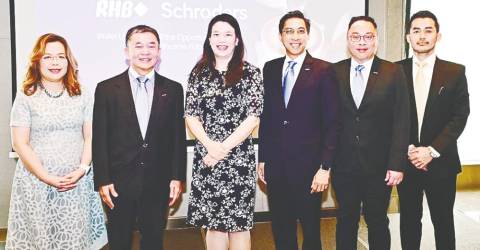ADVERTISE HERE
GENTING HIGHLANDS: The Roundtable on Sustainable Palm Oil (RSPO) and the Malaysian Sustainable Palm Oil (MSPO) are working on formalising dual certification for the standardisation of sustainable palm oil by November.
RSPO market transformation deputy director, Malaysia and Singapore, Islah Ishak said RSPO CEO Joseph D’Cruz met with MSPO CEO Mohd Shahari Idris earlier this month to discuss the possibility of collaboration via a memorandum of understanding, starting with the mechanics for the dual certification process.
“We are ready to collaborate. The goal is to complete everything before November. Since it’s September, I have about two months left to make it happen. So, it will be ready within the next two months,” Islah told SunBiz at the Genting SustainBiz F&B Expo held recently.
Touching on the certification of local palm oil players, Islah said that only 20% of the market players are certified currently, and RSPO’s vision is to get the rest certified.
“We need to reach the remaining 80% that has yet to be certified. Our vision is clear. We can only achieve this through collaboration, not alone.
“Over the past 20 years, the focus has been on normalising and making sustainable palm oil the standard. However, it is challenging without collaboration, particularly with government and related agencies,” Islah said.
She mentioned that FGV Holdings Bhd, which was previously RSPO certified, has now decided to forgo the certification since it primarily sells to China and India, where RSPO certification is not required.
“If we were to collaborate with the Chinese and Indian governments to encourage them to prioritise certified palm oil over conventional palm oil, it could drive more support for sustainability. Ultimately, it has to start with collaboration,“ Islah said.
When asked about certification for domestic smallholders, Islah said RSPO certification is voluntary, unlike MSPO, which is mandatory.
Companies are required to obtain MSPO certification to receive a business licence from the Malaysian Palm Oil Board (MPOB).
“Once they have MSPO certification, obtaining RSPO certification becomes optional for them. Often, the main issue for us is funding. Even if we have our own resources to help with certification, it might not always be sufficient. As part of the market transformation team, I work on finding additional funders to support the certification process,” Islah said.
Part of RSPO’s certification process is to assist smallholders and plantation owners in ensuring the accuracy of all their documentation.
“The European Union (EU) requires traceability to verify that palm oil sources do not contribute to deforestation, whether this is accurate or not. We ensure that we have demonstrated this traceability on our end,” Islah said when asked about the EU market on certification and recognition.
Moving on, Islah said with the rise of the circular economy, where zero waste is the goal, RSPO is now looking not only at palm oil itself but also at its byproducts.
“Personally, I see potential in sustainable aviation fuel (SAF). Given that the aviation industry is increasingly required to commit to biofuels and decarbonise, blending green fuel with jet fuel is one way to achieve that,” she said.
“We are now working to include standards that ensure even waste products are certified as sustainable. For example, SAF must meet proper sustainability certification. In the aviation industry, sustainability often means using green fuel; anything non-fossil-based is considered sustainable.
“However, our definition is stricter – it includes no deforestation. So, while their focus is simply on non-fossil fuels, we emphasise that, beyond palm oil, sustainability must ensure no deforestation,” Islah said.
In September last year, Sarawak Deputy State Secretary Datuk Dr Muhammad Abdullah Zaidel said the state would begin commercial production of SAF from microalgae this year. Sarawak aims to produce 100,000 barrels of SAF per day by 2030.
SAF, which has the potential to reduce carbon emissions by around 80%, has powered about 450,000 flights by mid-June 2022.
Low-cost carrier AirAsia is reportedly exploring the possibility of incorporating SAF into its fuel mix before 2025. Meanwhile, national oil company Petroliam Nasional Bhd is investing in SAF technology from crude algae oil that is being developed in Sarawak.









 English (US) ·
English (US) ·